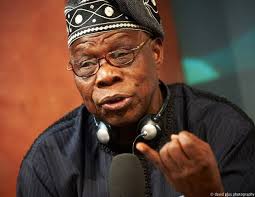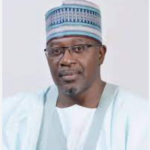The newspaper of Friday, December 29, 2006, carried very copious quotations from a statement issued by the Movement for Unity and Progress (MUP), which examined various issues on the nation’s political firmament.
The background to the statement, was the heating up of the political space by the President Obasanjo, and the impression that has gained currency that despite the open declarations to the contrary, Obasanjo was still attempting manoeuvres to truncate the transition to a new administration this year, 2007.
The MUP statement pointed out that the worsening relationship between Obasanjo and Vice president Atiku Abubakar, induced by Obasanjo, might in fact be part of a ploy to ensure the continued stay in power beyond May 2007, by Obasanjo. It was the opinion of the MUP that Obasanjo was trying to push Nigeria to the precipice through his recent actions, such as the declaration of a vacancy in the vice presidency and the series of impeachments of governors of various Nigerian states. It is instructive that the MUP press statement has been titled “ Let’s Help President Obasanjo, Shall We?. MUP took a look at the use of the battering ram called the EFCC to hound Obasanjo’s opponents and several other such acts and added that “General Obasanjo has built a well-heeled reputation as the man that must be obeyed and for better or for worse, has lived up to it in all material particular he has been Nigeria’s leader”.
“True , General Obasanjo, unlike General Pinochet, didn’t enjoy the luxury of ruling without a constitution. But this was (not) for lack of trying- he has labored long and hard to overturn the Nigerian constitution or, at least to have it rewritten. The existence of a constitution occupying the same space with him was a great nuisance. It was a problem he needed to resolve and resolve it he did somehow.
Whenever and wherever there was a clash between what the constitution said and what the General wanted, he had always taken the ‘ liberty’ to ‘interpret’ it to ‘suit the occasion’.
Furthermore, the MUP pointed out that “whether in relation to his political enemies or those that contradict his ‘reform agenda’ or ask too many questions about the implementation of the privatization program or insist on term limits etc.
General Obasanjo had never hesitated to meet them head on with an iron fist. There has been no shortage of weapons available. So contemptuous has he been of the law and due process and the ruthless he has been at scorching his enemies that many Nigerians have come to believe that war may be his first love. It may be said that most Nigerians can no longer be shocked by anything that General Obasanjo does. That which has no remedy should be without regard, they seem to believe.
It must indeed be clear that as long as General Obasanjo carries on as the sole proprietor of the PDP as well as the imperial ruler of Nigeria and his lips continue to be watched by closely by hapless officials anxious to keep their jobs in the government, there can never be peaceful elections nor a genuine transition at federal level in 2007.
The observations above are very apt, and there doesn’t seem to be anything to add to the, but for me at the heart of the press statement is a series of interrogations that really touch the essence of the Obasanjo problem which faces Nigeria today. “Why is General Obasanjo scared of leaving office? What is driving his phobia for life as an ex-president, a private citizen? Are the fears rational? If they are, can they be addressed? If they are not can they nevertheless be cleared? Is the president capable of doing it himself? If not, do we have the capacity, a responsibility, even perhaps a duty to help rid him of the malaise? We must ask these and similar questions and act wisely lest the ongoing recrimination and indignity take a life of their own and present a necessary search for a road map that may yet lead us out of this escalating crisis. If General Obasanjo seems prepared to lay down his life and the lives of the other people rather than surrender power, wouldn’t common sense suggest that we meet with him and discuss the terms on which he may hold back from such a brink?
Can’t we find it within our power to make proposals that may persuade him to surrender his arms ? should we continue to invest our energies analyzing the dangers created by the general without a corresponding search for possible remedies?
When I read the MUP statement last week, I put a call through to Colonel Dangiwa Umar, to discuss the various points raised in the press statement, and made a promise to use the various points as the basis for my write-up this week. This is largely because the different points interrogated have been at the root of several pieces that we have discussed over that Obasanjo’s exit strategy has always been not to exit, largely because of the crimes that he has committed during his husbandry of our country. While it lasted, it must have felt very sweet to serially rape a nation to fester his own nest, and eight years of power seemed be like forever. Obasanjo seemed larger than life, Nigerian was under the rule of his thumb and at will he literally could turn day to night: import waivers to cronies; oil blocks allocations that he could also cream returns from: a dubious privatization policy from which he became a proud owner of enterprises in telecommunication, banking and it is also strongly rumoured, even in aviation.
The list is endless, but the man was forever conscious of the fact that Nigerians were keeping tab of the way he has been short-changing them; they are very much aware of his incredibly cynical opportunism, of the preachments against corruption while he corruptly amasses wealth along with a retinue of cronies, many of whom are holding in (blind?) trust for him several of the dubiously privatized enterprises that they stole from the Nigerian people. From his record, dating back to the Murtala Muhammed’s regime, when a decision was taken that no member of the leadership should purchase shares from the indigenization program of the day, Obasanjo always had a criminal-like cunning of bending the rules of the day to ensure that he earns a handsome profit. It is this cunning that reached a head when he now had the opportunity to rule Nigeria from 1999 to 2007.
But as the saying goes, no matter how long the night, it will give way to the light of day. Settled in comfort of his power, it suddenly dawned on Obasanjo that the tenure was going to end before long: it was that realization which drove the third term agenda. He failed spectacularly in his manipulative schemes, but lacking in respect for the Nigerian people, he has continued to scheme against the nation’s constitutional order. For Obasanjo, the myth of his infallibility is more important than the security and good order of our country. He is prepared to pull down the house, for as long as believes that outside of power he could be called upon to account for all the crimes he has committed against the Nigerian people. Obasanjo lives permanently with disturbed soul, troubled about the lacerating imageries of returning to prison and ending his life in the dustbin of history, where I frankly think he belongs.
But this is not even the point. I think the interrogations from the MUP are meant for members of the Nigerian ruling class. Are they ready to do deals to ease Obasanjo from the crises that he has induced and which are threatening to tear the nation apart? Are they able to offer Obasanjo an exit that will allay his fears about returning to prison, while at the same time assuaging the feelings of the Nigerian people for justice and the restitution of our nation’s patrimony that Obasanjo and his cronies have, put bluntly, stolen under his privatization policy? Are there lessons that the ruling class can draw from the lawlessness of Obasanjo to be able to improve constitutional rule and rule and due process in future? Can a social content be inserted in the process of ‘shock therapy’ neo-liberal capitalism which Obasanjo has implemented over the past few years, a capitalism that been an assets-stripping process of banditry, whereby a few people around Obasanjo have become famously rich, while the majority of Nigerians have become poorer and hopeless?
These are just a few of the questions that need to be answered in any effort to help Obasanjo, like a bull in a chinaware shop, to find exit from the cul-de-sac that he dug himself into, in the very desperate desire to cling to power because he is unsure of what fate holds for him after he exits in just five months from now. But given Obasanjo’s legendary rudeness is there a section of the ruling class that with the guts to really take up the challenge of confronting him even when it is ultimately in his interest to negotiate a safe exit from power? The question is, because his praxis to date does not give the impression that the man is aware of just how much of a lame duck president he has become, despite the capacity he still possess to deal a body blow to the aspirations of the country.
I am ever so skeptical about Obasanjo, but would be pleasantly surprised if the MUP and other patriotic bodies can pull through a project to save Obasanjo from himself and help to save Obasanjo from himself and save the nation’s democratic process from the ambitions and desperacy of an expired despot, who extended eight years like biblical prodigal son, and then waking up to discover that the time has come to confront his fate in the hands of the Nigerian people. The next few months are going to be very interesting in our country.
WHAT DOES IGP EHINDERO WANT?
Recent reports in the media have suggested that Inspector General of Police, Sunday Ehindero, has written for a six months extension of his already controversial tenure as the chief helmsman of Nigeria’s police force. But all patriots should do everything to ensure that he does not get the extension of his tenure. I believe that he has infact asked for the extension of his tenure ( if granted, it would end by the time the 2007 elections are concluded), at the behest of Obasanjo.
It seems obvious that the whole purpose of keeping Ehindero in office is to have an Inspector General of Police who would either acquiesce or look the other way, as the PDP regime massively rigs the 2007 elections; Ehindero’s role is expected to be like what they got Tafa Balogun to do in 2003. In the past few years we have seen IGP Ehindero hands-in-gloves with the PDP and the presidency, to subvert the nation’s constitutional order. Political parties in opposition to the PDP, civil society groups and the National Assembly should oppose the abuse of power which Obasanjo has used to keep Ehindero beyond his mandatory retirement period. It seems that Obasanjo is not too sure that a new Inspector General of Police, other than Sunday Ehindero, might not be a sure bet for the rigging of the 2007 elections, the only basis that can earn the PDP power at the centre in May 2007. SUNDAY EHINDERO MUST GO!!!


